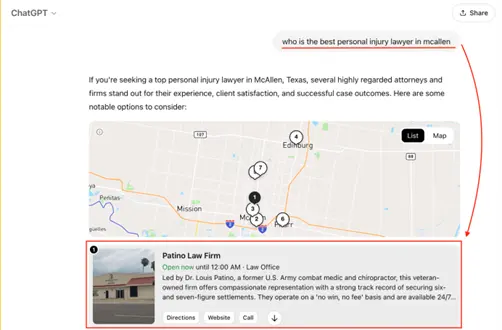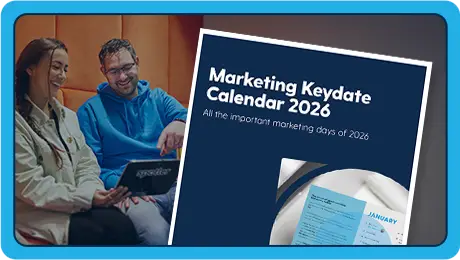Judging by the interest in events we’ve run about it over the years, SEO is consistently one of the topics marketers are looking for help with. And the arrival of AI Overviews has added a new layer of complexity to master.
So it was no surprise that our recent session with Charlie Marchant, CEO of Exposure Ninja, was incredibly popular. There was so much good stuff in the Q&A that we’re sharing it here for those of you who couldn’t join.
Watch Charlie’s session in full here.
Question and Answer
You talked about 3rd party reviews being important, do you know if there are any that are weighted more in AI search? e.g. G2 over Capterra etc.
The third-party reviews that get mentioned vary between different businesses, industries and prompt phrasing. My best advice would be to search your company and some competitors with phrases such as “is [name] a good company?” and “is [x] a good product/service?” and look at which platforms are most referenced.
In my experience:
- Reddit is frequently cited for broader consumer product reviews.
- Wirecutter, TechRadar, PCMag and Forbes tend to show up when there’s a need for expert or editorial validation.
- Glassdoor sometimes gets pulled when users ask about companies (not products).
- I haven’t seen many citations of Trustpilot, G2 or Capterra.
Are AIO impressions the most likely outcome for SEO/GEO? Should we prime clients to focus less on clicks/traffic?
There is a debate about the true impact of AI Overviews. Google itself has said AI Overviews can result in higher click-through rates for the content and links within them, but Ahrefs and Search Engine Land have run studies showing the opposite.
Based on Exposure Ninja’s client base, we’ve seen AI Overviews reduce clicks and traffic slightly, but conversions remain the same. Our main thought is that appearing in an AI Overview search won’t always get you a click but being featured there gives your business a “stickiness” — or brand recognition. Searchers see your business, maybe see it again in a few other searches, and eventually may enter into your marketing funnel. Being top of mind is very important, though admittedly hard to measure.
Clicks and traffic are metrics that we use in SEO to, ultimately, show progress towards conversions (leads and/or revenue). For the majority of businesses, the main result they want from their website is more quality leads or more sales. I would always recommend looking at both and to keep focus towards the end result that the client wants to achieve. If total conversions are going down or flatlining, then it’s time to investigate.
Will Google Ads die then, so should we shift more into SEO to future proof ourselves for AI?
Google Ads is definitely not going to die! Google Ads is still incredibly profitable for Google ($260 billion in revenue) so they won’t be doing anything that would sacrifice their ad revenue.
What’s changing isn’t the existence of Ads, but the format and placement. AI-powered ad formats are coming fast (e.g. ads inside AI Overviews, Shopping integrations, ads incorporated into AI Mode etc).
This means that over time, businesses will most likely need to adapt how they advertise: from traditional search-based ads to AI-native ad placements. However, right now, many of these ad products are new and I would recommend testing them first to see how they work for your business.
SEO and Google Ads are both important parts of a successful marketing mix, and the split of the investment very much depends on the business, its niche and its customers.
For a law firm, what areas would you advise focusing on first to get ranked via AI (PR, on page blogs etc.)?
Our Exposure Ninja team loves law firm-based SEO — it’s one of our specialist areas and we have a fantastic legal lead-generation playbook here.
For a law firm looking to increase visibility in AI search results, the top three recommendations I would make:
- Map Pack & Local SEO
Make sure your Google Business Profile is fully optimised with keywords, services, and good reviews. This boosts your chances of showing up in the Map Pack — which still drives valuable traffic and is often referenced within AI results for law firms. Work on local listings, local links and relevant location pages. - On-Page Content
Create clear, helpful service pages and blog posts that answer common legal questions in plain English. Use structured formats with clear headings, and make sure each service area (e.g. employment law, divorce) has its own dedicated page. - PR and Third-Party Mentions
Get featured in local news, industry blogs, or “best solicitors” lists. These external citations help AI tools trust your firm. If your law firm is local-focused, I would recommend ensuring strong local links as well.
Here’s an example of a ChatGPT result we optimised for our legal client, Patino Law Firm:

Is the AI overview based purely on GEO, or are there paid options?
AI Overviews are AI-generated answers directly in the Google search results. There are ads on some AI Overviews, which were introduced in October 2024. Both Search and Shopping ads appear directly within AI Overviews when relevant to both the query and the response provided. The ads continue to have a “Sponsored” label.
We are niche, and as far as I am aware we have not actively configured GEO, but we are very high in our search terms. How has this happened?!
GEO isn’t something you can “configure.” GEO refers to “Generative Engine Optimisation” and is the process of optimising a website to appear in AI search results. You can read more about GEO here.
How can I see where AI traffic come from on GA4?
To see AI traffic sources, traffic and conversions within GA4, you need to manually set this up by creating a custom channel group. I explain the workflow to do this in my webinar with Moz.
Do you have any B2B service based business examples of SEO + GEO?
We work with a lot of clients in the B2B services space, including accreditors, cleaning services, business software and sustainability consultants. SEO and GEO are important marketing tactics in the B2B space. We have case studies about those here.
With Google and Gemini being the same product, should we expect that SEO effort ‘Google’ first would have any better results on Gemini than on ChatGPT or other competitor platforms?
Google search, Gemini and Google’s AI Mode (which rolled out in the USA on 20th May) use the same index. By comparison, ChatGPT uses Bing’s index, as ChatGPT’s parent company, OpenAI, has a partnership with Microsoft.
While the results shown in AI Mode or Gemini aren’t identical to traditional Google search rankings, they are strongly influenced by them. So if your content ranks well on Google, it’s more likely to be cited or surfaced in Gemini/AI Mode answers.
Where do you see the future of AI agents fitting in?
To understand where AI agents are heading, I’d highly recommend watching Google I/O 2025, released on Tuesday 20th May. During the keynote, Google outlined bold plans for AI agents to move far beyond answering questions.
According to Google, they’ll be able to browse websites on a user’s behalf, research and compare options (like finding a venue or legal service) and take actions, including booking tickets for events, making reservations, and even planning and booking entire holidays.
This marks a major shift: users won’t just ask for information — they’ll delegate tasks. That means businesses need to prepare for a world where AI agents are browsing and using their websites and making decisions on them. Your website, content and services must be accessible, trustworthy, and actionable for agents, not just humans.
I expect we’ll look back on how we search today and see it as slow and manual. We’re already seeing tools like AI Mode and other LLMs scan hundreds of website articles before giving us an answer, instead of us having to read through all of those links. AI agents will remove “laborious” search tasks that at this moment many of us may not even realise are laborious!
CoPilot hasn’t been mentioned – do you see much traffic/use for this AI or have any data on how this performs compared to the ones you have mentioned?
Microsoft Copilot has gained significant traction, particularly within enterprise environments. As of early 2025, Copilot has 33 million active users. However, when compared to ChatGPT, Copilot’s reach is notably smaller. In February 2025, ChatGPT recorded 173.3 million daily visits, while Copilot’s monthly traffic stood at 98.9 million (Windows Central).
For our clients who are across both B2C and B2B spaces, we haven’t seen any CoPilot traffic. Given Copilot’s strength lies in its integration within the Microsoft 365 ecosystem, from what I have heard, its benefits have mostly been in speeding up internal tasks for workplaces using Microsoft 365 systems.
Would ‘paid’ PR articles still count for AIs? I.e. often partner content can include a fee!
Sponsored articles, like any other content, could be included in AI Overviews or Gen AI answers.
What advice do you have for small B@B businesses on this? Where do we even start – should we just carry on writing content on our websites in the meantime
My advice for smaller businesses and start-ups is to very clearly decide on your positioning and your target customers, and build your marketing strategy around this.
For example, well-known skincare brand The Ordinary built their business around two clear positions: “science-backed skincare” and “best value skincare.” Their whole SEO, Content and GEO strategy strongly focuses on reinforcing these positioning statements for their target customers, both on their own website and in off-site content and PR.
If you’re in a competitive market, then it’s incredibly important to differentiate yourself. With AI search you cannot be “everything to everyone”. Better to craft a clear niche, nail it in SEO and AI search, grow and then expand over time if operating within a fairly competitive sector. If you’re operating in a blue ocean sector, then competition will be lower and there’s even more opportunity to do well in search.
What was the sentiment analysis tool mentioned?
The tool is called Profound. It’s best suited for large and enterprise businesses.
For smaller businesses, Semrush has a great AI toolkit that includes a simpler version of sentiment analysis.
Does this mean that if it is not doing the query (ie the user has not asked the GPT to search online) – that the user could receive outdated information?
This could be the case depending on which LLM you’re using.
For example, ChatGPT (Free version / GPT-3.5) does not have browsing access so responses are based on static data (cut-off: around October 2023). Claude (Anthropic) does not have live browsing, so all answers come from static training data (cut-off: around August 2023 for Claude 2.1).
If you’re using the paid version of ChatGPT and have browsing enabled, then it will be able to search the internet and you’ll receive up-to-date information.
How does this work geographically? We noted that ChatGPT in UK vs ChatGPT in Czech gave different results to the same prompts.
Location does influence AI-generated results. Even when browsing is off, ChatGPT (and other LLMs) often tailors its answers based on your IP location or selected language. This happens because the model has been trained on geographically diverse content — so it learns associations between topics and regions.
For example, if you’re based in Czechia, you may get recommendations for region-specific companies or providers, or you may get examples from that region.
When browsing is on (like in ChatGPT Plus, Perplexity or Gemini), results become highly location-sensitive because AI pulls from locally ranked search results, may access country-specific versions of websites (e.g. google.co.uk vs google.cz) and will factor in local results from third-party websites.
We do our white papers and additional stuff on PDF for easy download from our website – will AI take the text from these into account?
Sometimes, but not reliably. It’s best to ensure content is on your website and is clear and accessible to read.
AI tools can read and summarise PDF content, provided the PDF is publicly accessible (not behind a form or login wall), the text is machine-readable (not just an image scan) and the page it’s hosted on is crawlable (no no-index tags, robots.txt blocks, or broken links).
However, AI browsing tools often prioritise pages over PDFs. Content inside the PDF may not be indexed in the same way as your page text — so it’s less likely to get cited. I would recommend repurposing key PDF content into blog posts or landing pages, and using PDFs (whitepapers, eBooks etc) as supplementary content assets.
I only sell to a limited geographical area. All my traffic currently comes from local organic searches, mainly via Google. Will AI still have the same effect on my business?
AI search is getting smarter about location, so if your business only serves a specific area, it shouldn’t be shown to people outside that region. Map results often show up inside AI search results on ChatGPT and other LLMs and so local SEO is also important within AI search.
To stay visible, local businesses should keep their Google Business Profile fully optimised, use clear location signals on their website (like service area pages, local schema, and FAQs) and continue earning local reviews and third-party mentions.
How can we find out what queries the users are typing into ChatGPT so we can match wording?
Unfortunately, there’s no direct way to see what users are typing into ChatGPT. There are no tools like Search Console, Semrush, or others that give us query data from AI tools (yet!)
However, I would recommend using traditional keyword tools as a base. Many ChatGPT queries are just natural language versions of those same Google searches — so you can still match tone and intent.


